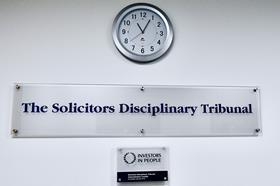The Solicitors Regulation Authority is fighting in the High Court to preserve the anonymity of clients cited in Solicitors Disciplinary Tribunal proceedings, arguing that legal professional privilege (LPP) should prevail over open justice.
The issue arose in the case of George Fahim Sa’id, who was taken to the SDT over accusations he had failed to carry out an enhanced due diligence check on a transaction with high risk factors for money laundering.
Sa’id was cleared, a decision the SRA has appealed. In addition, the regulator is challenging the tribunal’s decision to remove his clients’ anonymity on open justice grounds. It argues the tribunal has not followed last year’s precedent of SRA v Edward James Williams.
In Williams, Mr Justice Julian Knowles accepted the SRA’s argument that LPP would be breached by publishing a full version of the SDT ruling. By contrast, in Sa’id’s case an SDT panel in November 2022 ruled against anonymising clients.

Rory Dunlop KC, for the SRA, told the High Court that Williams was binding on the SDT and it was wrong in law to ignore it: ‘There is a public interest in maintaining LPP,’ he said. ‘You cannot simply point to the fact that open justice is involved and say that justifies some sort of balancing exercise to justify the disclosure of confidential LPP information.’
The SDT had said it did not have to follow the precedent because it was unopposed in the High Court by Williams himself, Dunlop said.
Dunlop pointed out that such appeals are always unlikely to be opposed, because a solicitor in such a situation would have no reason to fight an application preserving his client’s anonymity. ‘Chaos’ could ensue if the SDT proceeded on the basis it could decline to follow Williams because it was unopposed.
‘It is regrettable that as a result of the tribunal’s decision, dispensing of the earlier anonymity order, [a] member of the public was able to hear the names,’ Dunlop told Mrs Justice Thornton DBE. ‘There is no evidence that the confidentiality was then lost. We are not aware of any public reporting.’
Dunlop argued the anonymity should be restored to numerous individuals and companies mentioned in Sa’id. The Gazette asked the court to provide clarity on the scope of the anonymity at a later hearing, the date of which is to be determined.
This article is now closed for comment.































13 Readers' comments